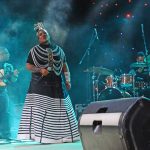Fela’s beat, continued
Paying tribute to the genius of the late Fela Kuti, Afrobeat musician Femi Koya brings back the spirit of African musicians with his powerful vocals and saxophone.
Author:
25 November 2019

Femi Koya is a Nigeria-born, South Africa-based Afrobeat musician and recording artist. He arrived in Johannesburg in 2005 at the behest of the church, but very soon found himself without his musical arranger and choirmaster job after the denomination he served no longer required his services. He had the option of returning home, but decided to stay and hustle instead. His is the story of many Africans who end up in precarious circumstances, unsure of whether to keep going, or to pack up and leave.
“I started learning music from the church actually,” he says over the phone, a week after his outstanding performance at Maboneng’s Afro Bru restaurant. The show was billed Felacantation, and saw the tenor saxophonist and vocalist dig into Fela Kuti’s extensive catalogue, giving the songs his own twist. Koya was supported by a cast of stellar musicians who showed their Afrobeat chops to the audience’s delight.
“I was always listening to the music of the late Fela Kuti, Miriam Makeba, Lucky Dube, Angelique Kidjo. That has always been there,” he says. Koya spent time away from Lagos when visiting his grandmother, which is where he heard more Afrobeat music.
“That’s why my last album before my EP is titled Village Afrobeat. It’s about my experiences from that village while growing up.”
Newtown sounds
Left destitute and without much to do, Koya thought to try out the club circuit in what was then a bustling Newtown precinct. There he became acquainted with sounds and ways of playing differently to what he was accustomed to.
“I was influenced by a different sound, from your maskandi, to your mbaqanga, to your rock music. I played everything. I joined bands, and I played different [music]. On my first album, Just in Newtown, I put that experience down. It was all about playing different sounds and connecting people from different [countries],” he says.
Related article:
In hindsight, that exposure drew him further from his roots. He credits Hugh Masekela with resetting his coordinates. “When we had the time to discuss [my album], he said, ‘You gotta [get] back to your Afrobeat; that’s where your power lies.’”
And Bra Hugh would know. Not only did he become Fela Kuti’s close friend during the time he spent in West Africa in the 1970s, but Miles Davis imparted the same, sage advice to him as a young man trying to break into the American music market during his early years of living in exile.
A tribute to legends
Questioned about the meaning of Felacantation, Koya responds: “It’s more like bringing back the spirit of African music legends. I called it Felacantation because Fela is the originator of the direction that I am now [going]. For me, it was about paying tribute to the gone African music legends.”
Koya organised the Afro Bru gig in collaboration with the Miriam Makeba Foundation, and called on the spiritual warrior’s granddaughter Zenzi Lee to perform two of Makeba’s songs – Malaika and A Luta Continua – on the night.
Related article:
From Fela’s catalogue, he picked Colonial Mentality, Gentleman, Water and Lady. Each song’s rendition elicited cheers from the seated audience. Some got up to dance, singing along to bits of the lyrics. One guy in particular incorporated shaku-shaku and zanku moves, which lent an edgy, modern feel to the timeless musical tradition.
The frenetic keyboard mastery, the well-orchestrated horn section, the talking drum, the thumping basslines and the sneaky guitar licks all contributed to the sound, while Koya’s athletic stage presence and microphone technique, along with his effortless switch between the horn and vocals, made for a memorable performance.
Politics and prophecy
A few days before the gig, refugees who had been staging a three-week peaceful sit-in at the Waldorf Arcade building in Cape Town, where the United Nations High Commission for Refugees is situated, were violently dispersed by the police following a court order. This raised concerns regarding the South African state’s commitment to quelling the xenophobic sentiment that has been bubbling across the country. In light of this, and taking into account the recent case where Nigerians fearing for their lives were repatriated, Koya wanted to address the state of affairs, continent-wide.“Whatever Fela Kuti was eyeing and making noise about, is still happening today. That’s why they call [him] the African prophet. We all in Africa, we are suffering and smiling,” he says, referencing the legendary song from the master. “We are living in Africa, but we don’t own [it]. We blame our forefathers for failing us, but we are now in the highest century. We know everything. We are very intellectual, [yet] the same things are still happening,” he says.


